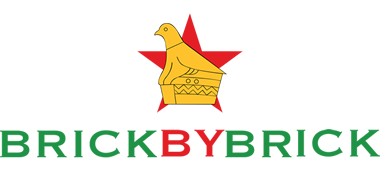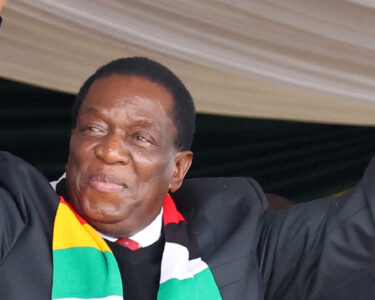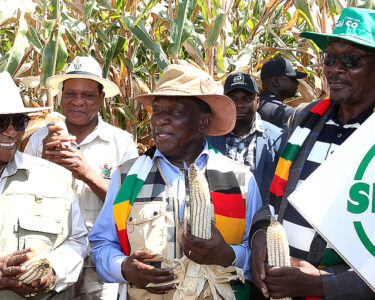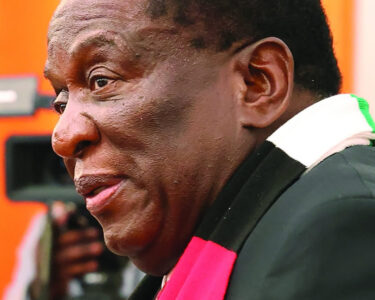In recent weeks, the Zimbabwean dollar has been under serious attack that saw black market rates rising up sharply, leading to increases in the prices of most goods and services in the country. The attack on the Zimbabwean dollar led to speculation that the government could succumb to pressure and abandon the local currency in favour of the US dollar. However, Zimbabwe’s President Emmerson Dambudzo Mnangagwa says Zimbabweans should sleep easy because the Zimbabwean dollar is not going anywhere.
“Our people must know that our currency is there to stay. It must sink. It is there to stay, but foreign currencies of other countries are not there to stay,” he emphatically told the Brick by Brick magazine in a wide-ranging interview conducted recently in the gardens of State House, Harare.
In the interview, President Mnangagwa articulated the main task of the new crop of African leaders saying “. . . our task is to integrate Africa . . .” and “. . . to make sure that the resources found in Africa benefit Africa”, adding: “We will not allow other countries to come and exploit us just because we don’t have the technology. Nada!”
On the illegal sanctions that have ravaged the country over the past 23 years, the President defiantly said: “The sanctions were intended to collapse our economy, to collapse our currency, to have the population of this country rise against the government. Those things have not happened. Yes, the economy collapsed, and, yes, the currency collapsed . . . but we are still going to survive and succeed because we believe in ourselves.”
Without mincing his words, President Mnangagwa spoke about the country’s engagement and re-engagement drive, saying with regards to countries that Zimbabwe should be friends with, “no one can put pressure on me. Only Zimbabwean people can put pressure on their President. Not an outsider. How can I lose sleep if someone somewhere in his own capital thinks of putting pressure on me? How does that happen?”
President Mnangagwa was interviewed by our Editor-in-Chief Munyaradzi Huni, and our Managing Editor, Baffour Ankomah. Photos are by Tawanda Mudimu. You may need to sit down to read this, because it is not an ordinary interview.
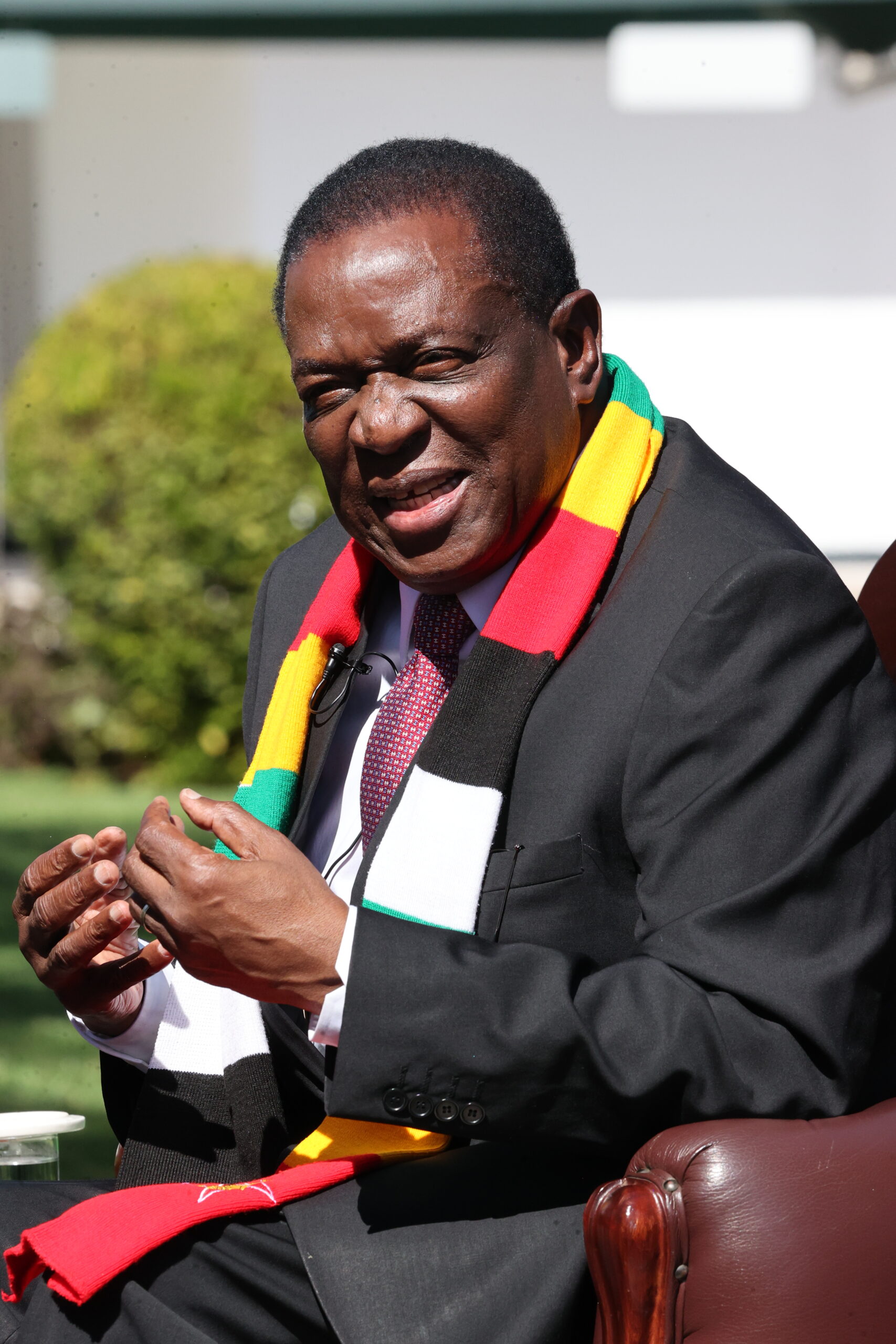
A: I am fine. I am taking the pressure very well.
Q: You are taking the pressure very well?
A: Yes, yes.
Q: Is there pressure?
A: Yes, there is pressure. You have already said it and I am positively agreeing with you. You are correct, there is pressure.
Q: Your Excellency, on 25 May 2023, Africa celebrated its 60th Anniversary. This is the day we remember the work of the founding fathers of this continent. How do you, as the leader of a resurgent Zimbabwe, fit into the vision of the founding fathers and what do you think the new crop of African leaders should bring to this vision?
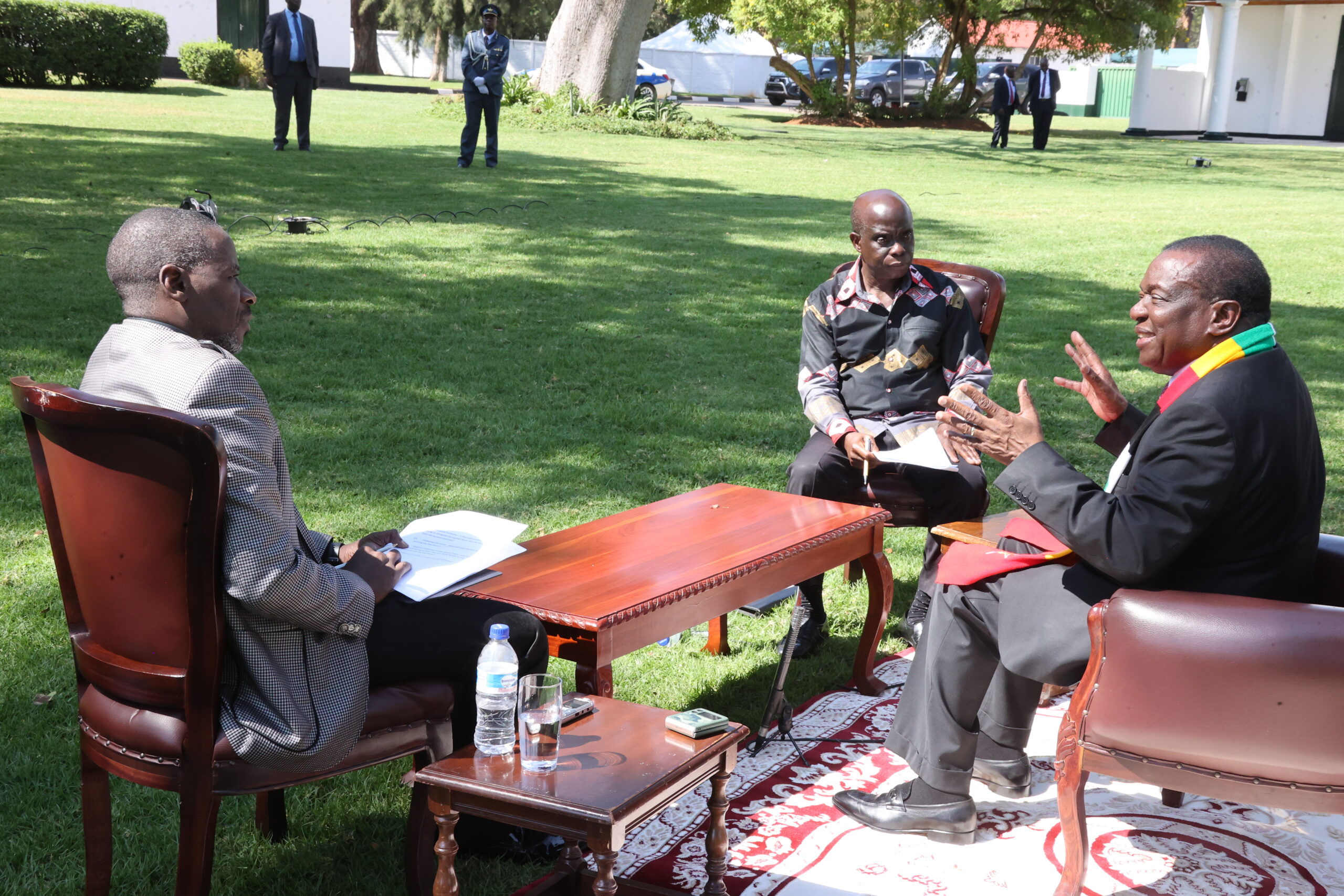
A: Yes, we celebrated the 60th Anniversary of the founding of the AU [African Union] but initially as the Organisation of African Unity [OAU] on 25 May 1963. This is the day when the founding fathers of the organisation created his organisation. They had foresight requiring that Africa should cooperate in the process of decolonisation of the continent. These great men included — I was in Egypt recently — so I will begin with Gamal Abdel Nasser, he was the President of the Arab Republic of Egypt.
There was Kwame Nkrumah from Ghana, there was Julius Nyerere of Tanganyika then, now Tanzania, Kenneth Kaunda of Zambia, there was also Modibo Keita of Mali, Jomo Kenyatta of Kenya, Milton Obote of Uganda and Haile Selassie of Ethiopia. These were some of the architects of the OAU at the time. We are very grateful for the vision of these founding fathers. They assisted the rest of colonised Africa to attain independence and freedom, including Zimbabwe.
Their mission at the time was to ensure that Africa become free, become independent states, become African countries with independence. They accomplished their mission.
My belief is that the vision of the current crop of African leaders, today, in my view, is not to pursue that vision that has been achieved. I think, now, our task is to integrate Africa, and the African Continental Free Trade Area [AfTCA] is one such an example. To integrate trade within the 54 African countries. Much more so, to make sure that the resources found in Africa benefit Africa and, by doing so, we have to change our focus.
Instead of believing in the former colonial powers for growth, industrialisation and modernisation of our economies, we internally focus on our resources and share the benefits accruing from the different economies of Africa so that we benefit our respective countries in the pursuit to grow our respective economies as well as collectively modernise Africa.
I believe that there is great potential in the future. Africa remains a continent with resources that have not been fully exploited. There is a possibility that the crop of leaders that will come after us will take Africa to a higher level where Africa will be a power in the world, not the current powers that are there.
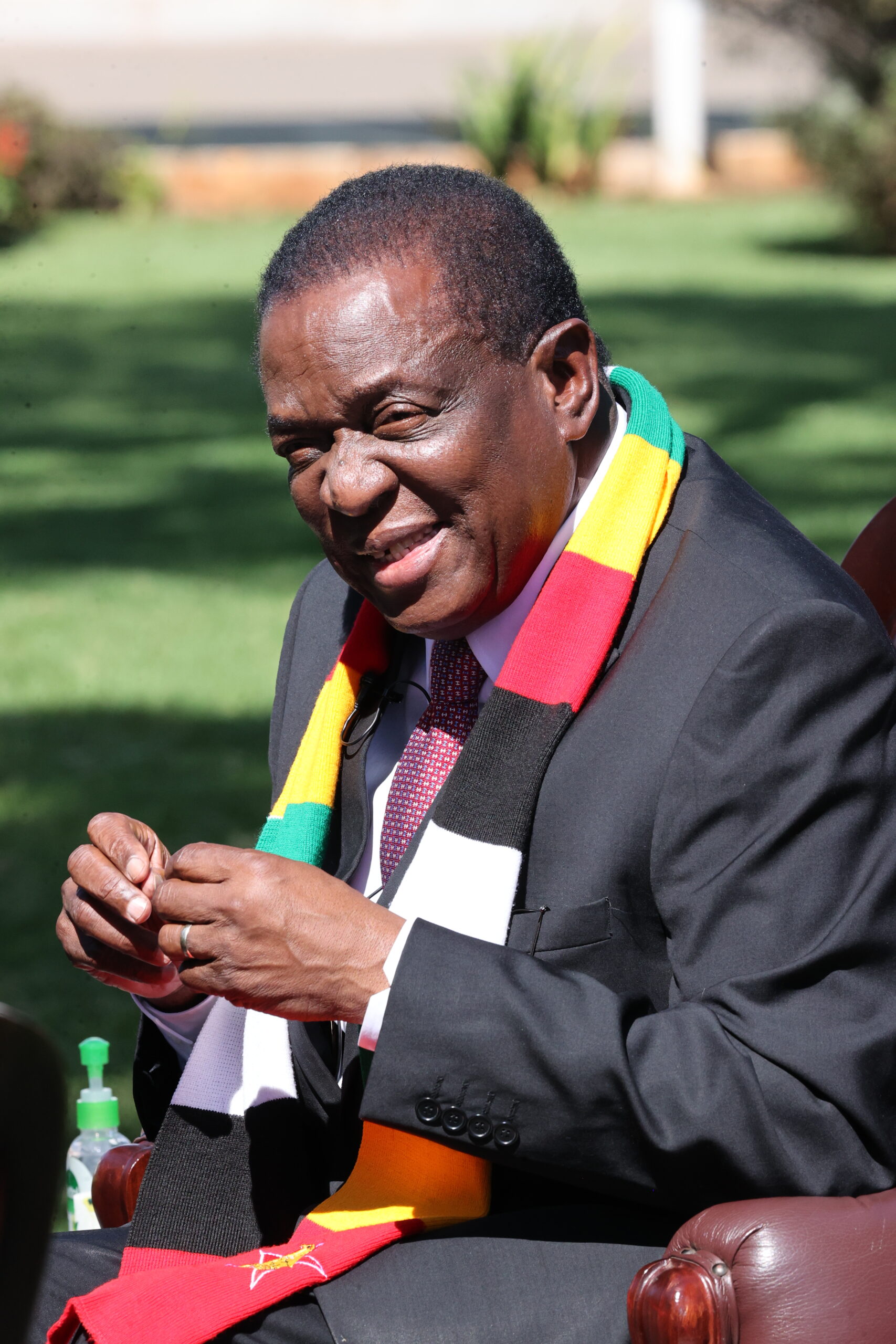
Q: On 18 May 2023, there was a big recognition given to one of the sons of Africa, the former President of Mozambique, Samora Machel, at the Museum of African Liberation in Harare. Are you going to broaden this recognition to cover the other founding fathers of Africa, like former Egyptian leader, President Nasser and others?
A: Well, we can look at this at two levels. When we look at President Samora Machel and his relationship with the liberation of Zimbabwe in particular, he played a significant role. Yes, we were based initially in Zambia, and in Zambia, President Kaunda was very solid as a liberator of Southern Africa assisting Angola through the MPLA [Popular Movement for the Liberation of Angola], Namibia through SWAPO [South West Africa People’s Organisation], Zimbabwe through ZANU [Zimbabwe African National Union] and ZAPU [Zimbabwe African People’s Union], South Africa through the ANC [African National Congress] and PAC [Pan Africanist Congress] and so on, but at the height of the armed struggle of this country, the late President Samora Machel took bolder steps in assisting us to liberate our country.
He closed the border between Rhodesia and Mozambique at a critical time when they had just become independent. That crippled and affected the economy of Mozambique, but he felt that there was no glory for Mozambique to play independent when it’s neighbour, Zimbabwe, was a colony. So he sacrificed more and stood for us.
Besides that, we did not only fight from Mozambique into Zimbabwe, Rhodesia then, but we also had colleagues from Frelimo whom we operated with in Rhodesia then. So we have shared blood with the people of Mozambique in Zimbabwe. Therefore, this recognition was an opportunity to say thank you to the people of Mozambique for their great leader, Samora Machel. To recognise the sacrifice he did for his country and for us, we felt it necessary to give him space and grant Mozambique an opportunity to construct a monument of Samora Machel.
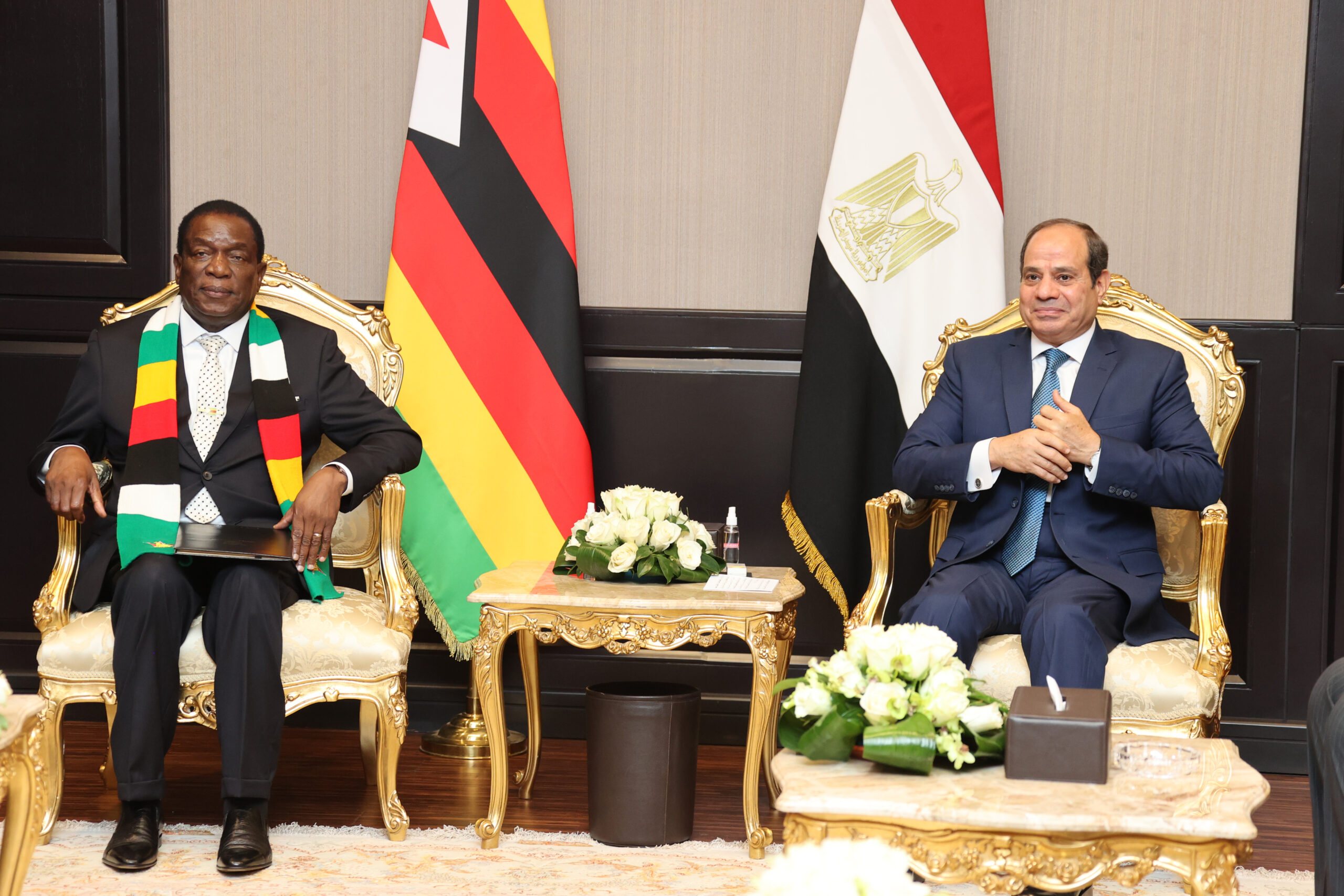
Yes, we have people like Nasser and I was in the Arab Republic of Egypt in 1963, around May, June thereabouts for training under Nasser. So Egypt also assisted us to train for our liberation. It was not only comrades from Rhodesia [Zimbabwe] that he was assisting. I met people and colleagues from Mozambique in Heliopolis in Egypt. I met people from the ANC in Egypt. So Gamal Abdel Nasser was really a tower of the liberation of the African continent. He was quite a visionary. He ranked the same with people like Kwame Nkrumah, the Nyereres in our area here.
So I have suggested to President Abdel Fattah El-Sisi — I met him recently in Sharm El-Sheikh in Egypt — that if he accepts, we want Egypt under him to construct a monument for Gamal Abdel Nasser for the visionary manner in which he supported the liberation of Africa. He was happy that we extended the offer.
Q: Your Excellency, there seems to be a resurgence of pan-Africanism on the African continent. Would you say, Africa is now beginning to assert itself in global politics and would you say this is a Nkrumah incarnate?
A: Well, I don’t know what you understand about pan-Africanism. What I understand myself is that at that time, in the early 1960s, when pan-Africanism was being articulated, it was a way by those independent African countries to assist in the liberation of colonised African countries. There was need for pan-Africanism, for African countries to collaborate and liberate ourselves so that we became independent.
I don’t know how pan-Africanism applies now because that was extremely political, but today we are not emphasising much on political issues because we are now all independent. We are now looking for integration. I don’t know whether pan-Africanism can apply.
Q: We thought pan-Africanism would come in the context of fighting for economic independence?
A: This is what I am saying. You may stretch the meaning but at the time it was being applied, it was applied for political reasons, like I have said. This is what I understood at the time. Fortunately, I was there. You were not there. Fortunately, I was there, so I understood it from that context. If we extend the meaning to mean continental integration, economic integration, visa integration and so on, it’s welcome. I don’t think it is misplaced.
Q: Do you think the current African economies are speaking to African unity because you earlier alluded to the fact that we should move away from the rhetoric of the founding fathers because we are now independent? Having been in power and having interacted with your colleagues across Africa, do you think African economies are speaking to African unity?
A: Our African economies are at different levels of development, but what is critically important is that whenever the AU meets, this is one of the topics which we discuss. We discuss that we should share our resources, we should integrate our resources, we should assist each other to modernise and grow our economies. Most of our economies were tied to the colonial powers.
We are lucky here [in Zimbabwe] because we have had sanctions. We have over 400 companies in this country linked to Britain and when they imposed sanctions, the British companies cut their relationship with their sister companies here in Zimbabwe. That has helped us to be more independent and pull away from the British.
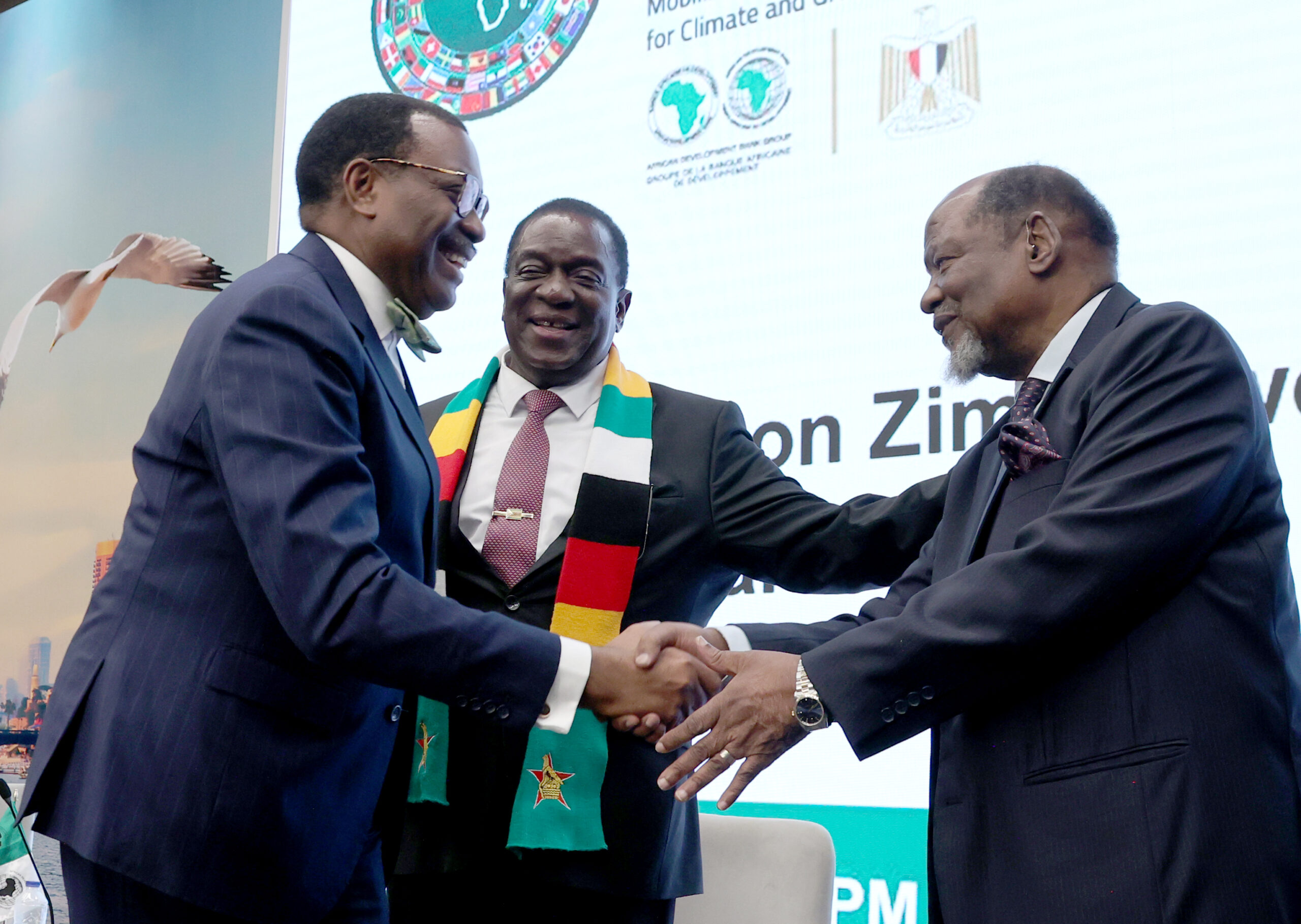
Other countries have had no opportunity or advantage of sanctions. They may find it difficult to move away. If they were colonised by the Portuguese, to move away from the Portuguese and if they were colonised by the French, to move away from the French. Recently, I don’t think I showed George [Deputy Chief Secretary — Presidential Communications], but I showed the Minister of Finance [Professor Mthuli Ncube]; President Macron [President of France] making an apology. Have you read it or seen it? Have you seen the apology saying he is now apologising for the inhuman treatment of the African people in French colonies? He said we were looting your gold, we were looting your diamonds, we took your artifacts and so on. He said we are apologising.
I have forgotten the figure he spoke about, but it must be trillion US dollars (or is it francs?), he estimates to have been looted from former French colonies. Now he is making that apology. We know that at the time France gave independence to its colonies, they remained tied to France. And when they were giving independence they said ‘We give you independence above the soil, not under the soil of your countries.’ I hope they have now changed, but that was the situation at the time of independence.
This has not been the same with us. When we said we want independence, yes, initially, we got political independence in 1980 but after 1990, we assumed full independence because now the provision [on land] in the Lancaster House Constitution had expired. We are independent in terms of both our politics and in terms of our resources.
No one gives us direction as to what we must do with our resources. We have to say how do these resources benefit us? When we don’t have the technology, the skills or the global capital to exploit them, they [our resources] can stay down there. We will not allow other countries to come and exploit us just because we don’t have the technology. Nada! [Portuguese for an emphatic No]
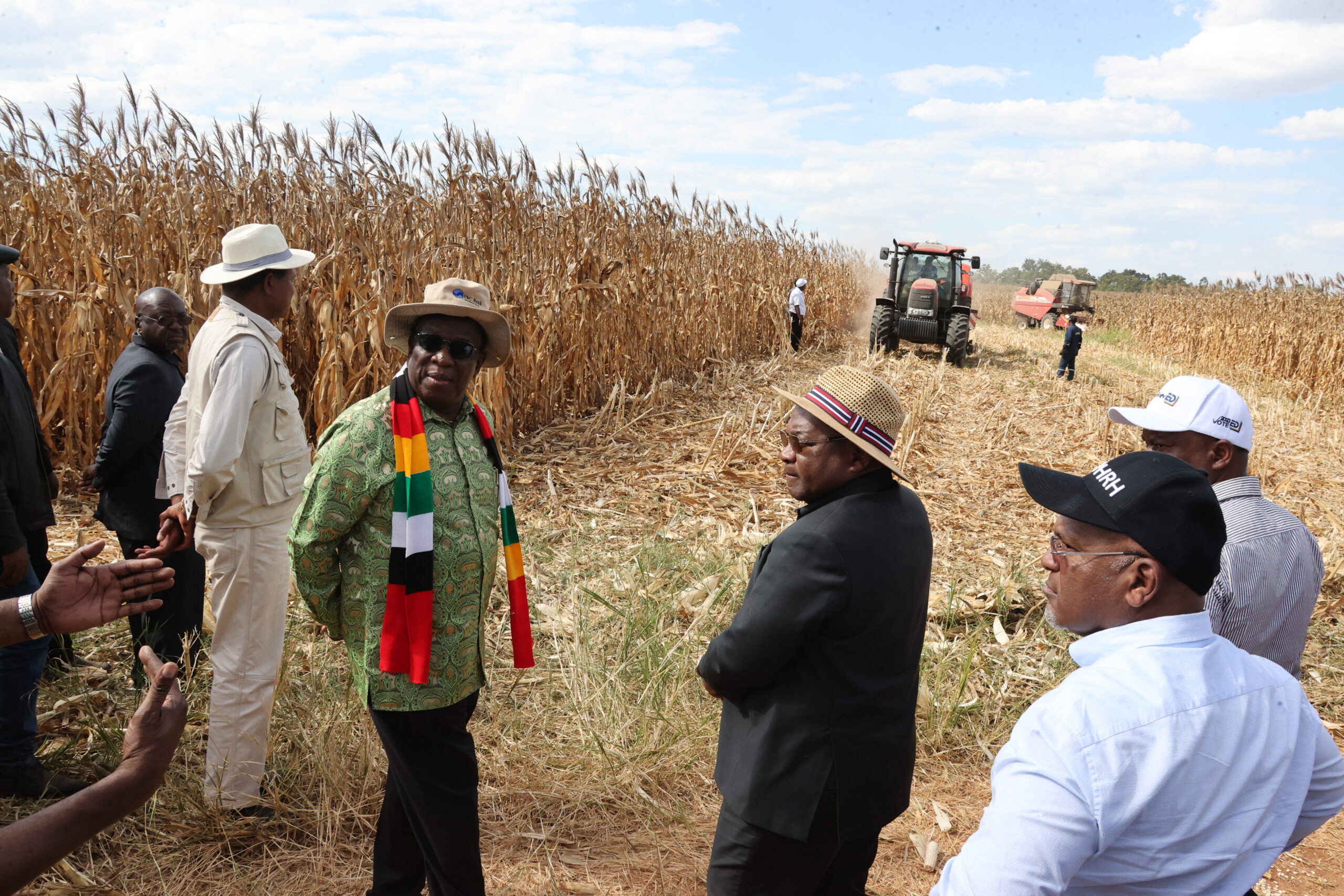
Q: So are you saying there are blessings in sanctions?
A: Absolutely! Yes, absolutely! Because of these sanctions, it forced us turn inward. The sanctions were intended to collapse our economy, to collapse our currency, to have the population of this country rise against the government. Those things have not happened. Yes, the economy collapsed and, yes, the currency collapsed, but when we decided that we must now look at what we have and depend on our own resources to build our companies and our country – nyika inovakwa nevene vayo (a country is built by its own people) — now our economy has recovered. It is now on a growth trajectory. We have now introduced our own currency. Yes, it’s under attack, we expect it, but we are still going to survive and succeed because we believe in ourselves.
Q: Over the past few months you have hosted quite a number of African Heads of State and Government and you have travelled to a number of countries for different engagements. Can we say Zimbabwe is now inward looking, continentally? We mean in terms of looking for solutions to its challenges.
A: That is our engagement and re-engagement drive. We engage because we want to relate to the international community and the community of nations. We re-engage with those who had disengaged for whatever reasons. We say we are ready to engage you, but if they refuse, it’s their business. Our door is open. That is what we are doing.
As far as the economy is concerned, we are now 23 years under sanctions and in those 23 years, we have never received lines of credit from outside the country. How have we survived? We survived because we are looking inwards. We are going to survive from what we ourselves can produce and market. We are so happy with that.
If there were no sanctions of this nature on this country, we would still be believing that to build a road, we need an international tender; to build a dam, we need an international tender. We have busted that myth. We now know that if we want to construct a dam, for example Gwayi-Shangani Dam, we finance it ourselves. Are we not financing it ourselves? Are we not building it with our own engineers? What is this other dam in Mashonaland East? Muchekeranwa Dam, we built the dam on our own? We are making roads on our own.
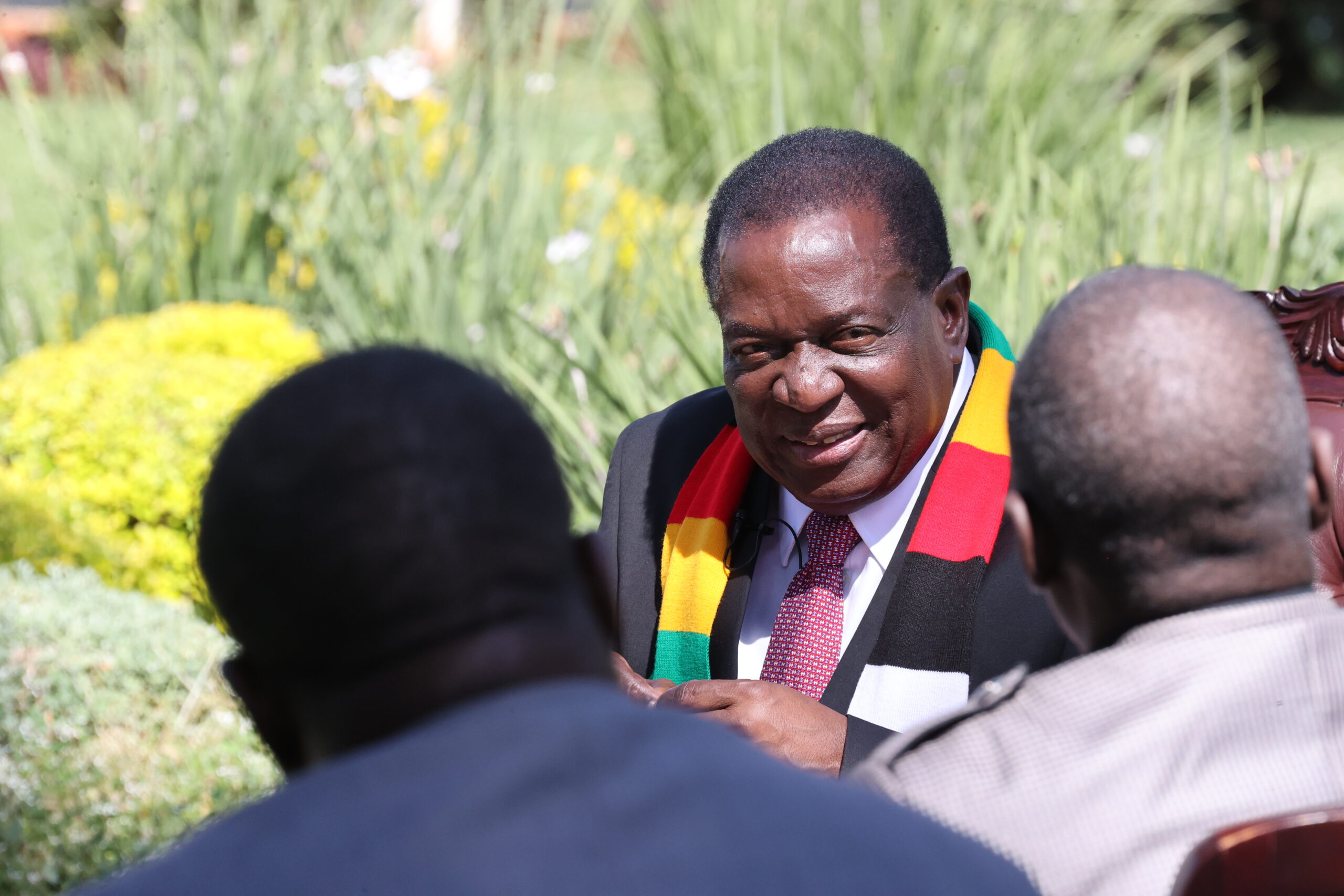
In the past, we believed that these huge projects required international tenders. Now, away with international tenders! We are doing it ourselves.
Q: Your Excellency, in a few months, Russia will host the Russia-Africa Summit in St Petersburg in South Africa. Have you been invited and are you going to the meeting?
A: Yes, I am going. I have been invited. In fact, every time since I came into office, each time there is Russia-Africa Summit, I have been invited and I go. There is no change.
Q: In recent months, South Africa has been subjected to a lot of pressure by some countries like the US that don’t want South Africa to host President Putin because of Russia’s special military operation in Ukraine. This won’t deter you from attending the meeting?
A: The Americans have their own democratic right to put pressure on whom they want and those who are having pressure from America have a democratic right to refuse to be pressurised. I understand my dear brother, [South African President] Cyril [Ramaphosa] is so clear about that. He is independent. A sovereign state of the Republic of South Africa.
Q: A few weeks ago, Zimbabwe received helicopters from Russia.
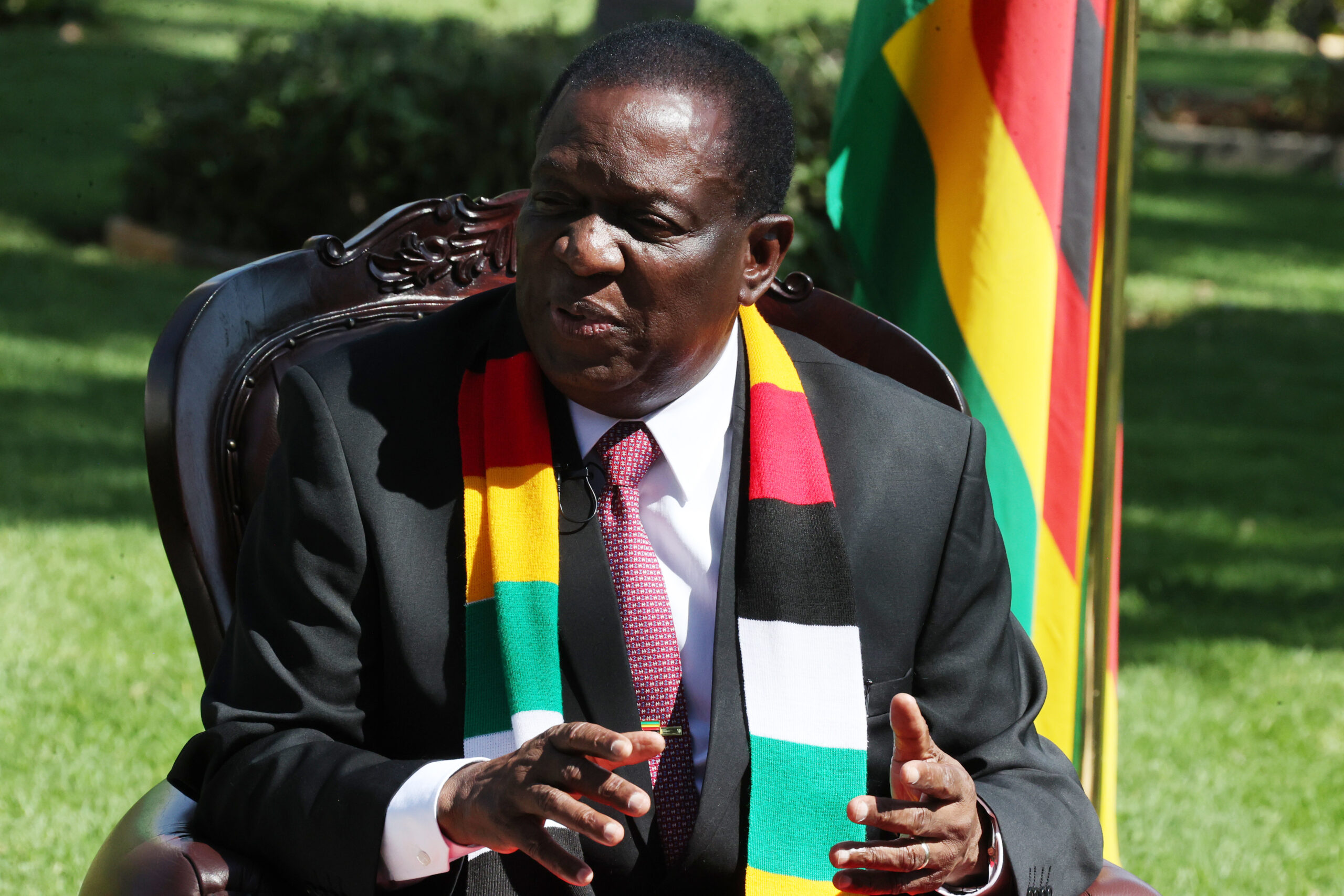
A: Not received. We purchased.
Q: Yes, Your Excellency, Zimbabwe received helicopters it had purchased from Russia. What does this suggest in terms of Zimbabwe’s foreign policy vis-a-vis the West?
A: What do you mean? We cannot go and buy helicopters from a country which has imposed sanctions on us. What stupidity will that be? You go and acquire from those who accept you. The Russians accept Zimbabwe and so we were able to purchase those 18 helicopters.
We have gone through several disasters and we have not been able to assist our people, especially during Cyclone Idai. Over 600 people died and we had no capacity to rescue some of our people. So I thought in my mind, it was necessary to capacitate ourselves so that if any disaster comes, we will be able to help our people.
Q: You are not afraid that this might further strain relations with the West?
A: An independent country being afraid of what?
Q: The pressure from the West?
A: No one can put pressure on me. Only Zimbabwean people can put pressure on their President. Not an outsider. How can I lose sleep if someone somewhere in his own capital thinks of putting pressure on me? How does that happen?
Q: So you are sleeping well?
A: Ahh, extremely well. But if Zimbabweans put pressure on me, I understand.

Q: Your Excellency, let us take you to the BRICS [organisation comprising of Brazil, Russia, India, China and South Africa] issue versus the Commonwealth. What are Zimbabwe’s chances of joining the BRICS and is the country ready for the new shift in global affairs?
A: I will answer the first part then you explain the global shift which you understand. We may have a different understanding. The first part, Zimbabwe has applied to join the BRICS Bank and the process is quite positive currently. We also applied to join the BRICS organisation and again the process is quite positive. All this is work in progress.
I have contacted my brother Cyril to speak for us in BRICS. I have contacted my brother Xi Jinping of China and he is willing to assist in that regard. I have also contacted Brazil, and they are willing to assist. I have not yet contacted India, but when I have the opportunity I will talk to my brother [Narendra] Modi [Prime Minister of India] to assist us in that regard. So far, it’s work in progress.
Q: And the second question is – is the country ready for the new shift in global affairs?
A: What is the shift?
Q: Now we see the BRICS are talking about introducing their own currency. The BRICS are asserting themselves on the world stage. They want to move away from the hegemony that America has had over many years.
A: We are not yet in BRICS.
Q: But you are trying to join?
A: Yes, we are trying to join, so I cannot comment on the activities of an organisation which I am not yet in but what I am doing as an outsider, I am in agreement. As an outsider, I am in agreement.
Q: Zimbabwe also wants to join the Commonwealth?
A: Yes, we have applied to join the Commonwealth and very soon they will be making a determination. They have sent two or so missions to Zimbabwe to assess us and the reports are positive. This is normal.
Q: Your Excellency, what is exactly the idea behind joining the Commonwealth? What is in it for Zimbabwe?
A: Those who are in the Commonwealth, do they have anything to gain? Even if it means going to drink tea, it is the Commonwealth. In the past when we were in the Commonwealth, we would benefit from scholarships, exchange of students and skills. That is the only thing. I don’t think there is anything really out of the world in the Commonwealth.
It’s just joining the club of others and you gain ideas as you interact. It’s a good thing to interact with others. Not that we think this country will change because we are in the Commonwealth. It changes because we have ideas of changing it ourselves. Not the Commonwealth.
Q: You recently visited the UK for the coronation of the King Charles III. Would you say that visit marks the turning point of the relations between Zimbabwe and the UK?
A: No, no. The ones who have a turning point are them. We have never closed our door against the British. Those who have opened the doors are the ones you should be asking the question. Is this a turning point you are now opening a door for the people you had closed out? Those are the people you should ask that question as far as I am concerned. We never closed our door to Britain and so when I got the invitation, I went. It’s them who have a problem, not me. It’s very clear.
Q: How were the meetings you held in the UK during that visit?
A: Well, when I arrived, I had a number of meetings. I had a meeting with the Minister of African Affairs, Andrew Mitchell. I met him for almost an hour. We had very good discussions and we have agreed to continue the discussions with Mitchell. The meetings were very positive and he thinks that this stand-off doesn’t benefit Britain and doesn’t benefit Zimbabwe. He said it is necessary that we find each other. Then I said, of course, those who climbed the tree can climb down. We never climbed any tree.
Q: Do you think the invitation was an acceptance by Britain that they have lost in their attempts to effect regime change, to remove a legitimate government here and also a recognition of the fact that you have made solid economic gains at home?
A: They have never openly said they had lost, but what I notice, what I glean is that they believe the stand-off does not benefit them nor does it benefit us. We have moved on. I don’t know whether they have moved on, but now it is them who have opened the door. It’s logical that they think it is necessary to have relations with us. It’s a logical conclusion, unless I am mistaken.
Q: A few months ago, you hosted Belarus leader, President [Alexander] Lukashenko. Considering his close relations with President [Vladmir] Putin, some think this was a show of defiance in terms of the position that the West has taken against Russia in recent months. Didn’t you think the visit could create problems for the country?
A: The United Nations is composed of 193 countries. There is no law at the United Nations that countries should not have relations with each other. You understand that? So, no country gives us who should be our friend and who should be our enemy. It is only us, who chose whom we invite and whom we do not invite here. We invited President Lukashenko and he accepted. He visited us and went back. We remained. No one has questioned me why he was here, except you.
Q: Your Excellency, let’s come back to Zimbabwe. This country has huge deposits of lithium, oil, uranium and other strategic minerals that put the country on call in terms of global power politics. Is Zimbabwe ready for the threats, some may call it the curse, that comes with these minerals?
A: I will never entertain the idea that what God has given us is a curse. If there are those who think it is a curse, it is their thinking. To us Zimbabwe, it’s a blessing. We are so happy that we have lithium, we are so happy that gas has been found, we are so happy that we found oil and we pray to God for giving us these minerals. Those who think these minerals are a curse, it’s their own problem.
We, as Zimbabweans, we are happy. We have never been told by somebody that we are going to deal with you because gold has been found in your country, we are going to deal with you because there is lithium. No one has ever told me that nonsense.
Q: In some oil-producing countries in Africa, they are not able to manage it well. That is where the curse comes in.
A: You have given the answer to yourself. They are not able to manage the resources well. Have we not been able to manage ours? If we fail, please tell me then I will just make sure we manage them well.
Q: Zimbabwe has discovered oil at a time when there is this push to move away from fossil fuels. What is Zimbabwe’s position regarding this push?
A: We move with the times. People are moving from fossil fuels to what? That is where we will go. How can we remain behind? It’s development. We will move with the times.
Q: We found out that when it comes to carbon credits, Gabon is number one on the continent, followed by Tanzania and, thank God, Zimbabwe is number three. However, we see that the benefits are not accruing to the country. Is this why Cabinet took a decision recently to cancel all carbon credits?
A: Those agreements were not done with government. Surreptitiously, these people came into the country and made these arrangements with villagers who are living next to the forests without us knowing. So when we discovered it, we said, no, no, you are exploiting our people, you are exploiting our country. Get out! If you want to go and benefit, yes, talk to us and then we make an arrangement that is beneficial to us and is beneficial to the investor. It’s a pure, pure democratic process.
It was very undemocratic to come and meet our people behind government and behind the authorities of the country. You go and make these arrangements, exploiting our people.
Q: Zimbabwe has been making efforts towards debt resolution and arrears clearance. Could you break down the debt for us and where exactly is this debt coming from?
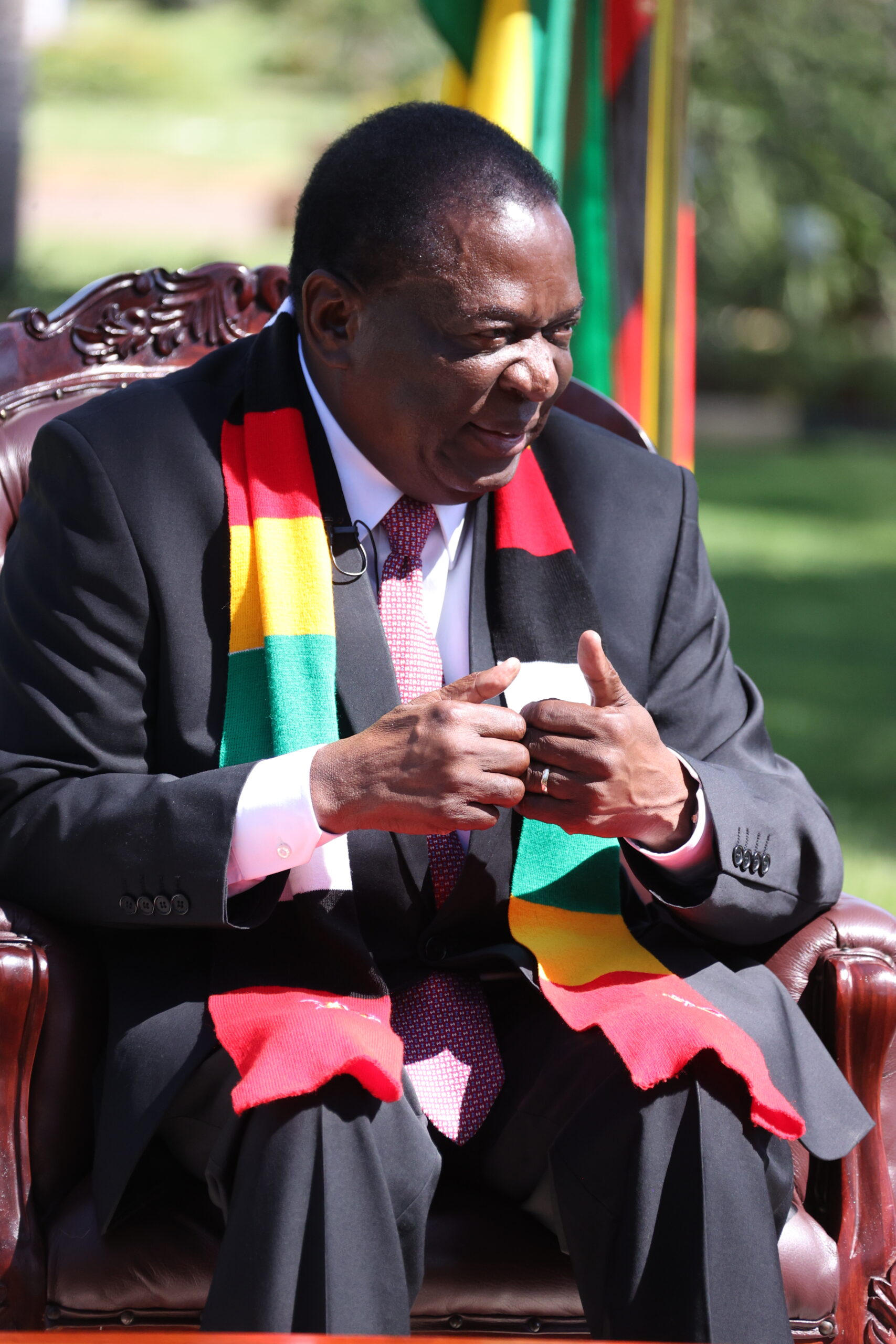
A: It’s difficult, but most of the Western countries are our creditors and since the imposition of sanctions, we have not been able to service this debt. It was around US$8 billion or thereabouts but because of penalties and interest [charges] it has now ballooned to about US$15 billion plus the compensation to the white farmers, the US$3.5 billion, it comes to around US$18.5 billion.
I said we must find a way, a platform, where we can discuss with the creditors. Other nations can go to the Paris Club and negotiate for the scheduling of their debts, cancellation of their debts and so on. We do not have that access.
So we decided to create a platform. I discussed with my young brother, the President of the African Development Bank, [Akinumwi] Adesina and he agreed to champion that exercise. We thought we needed another top son of the soil of Africa and settled on the former President of Mozambique, Joachim Chissano.
We formed this platform where we are discussing with creditors to find a way of discussing this debt, either for its cancellation or for its variation . . . Over the past 23 years we have never had access to lines of credit from the international financial institutions, especially those under the Bretton Woods institutions [the World Bank and International Monetary Fund]. None. We have been surviving on our own.
I don’t know whether you attended one of the meetings we held and all the ambassadors attended. One by one they supported the process that they will tell their capitals that this is a process that is useful to them and us. We are looking forward to a possibility of one, two, three creditors saying they can put forward or give us a 24-hour loan. You are given a 24-hour loan, it clears the debt, once you clear the debt then the institutions give you the money then the loan is paid back instantly. It’s a 24-hour transaction, but you need to create that atmosphere, that positivity, with the creditors. This is what we are driving towards.
Q: And you are seeing good progress?
A: So far so good except for one country, which I won’t mention, which is dilly-dallying; but it is doing better than we expected.
Q: Why is this country dilly-dallying?
A: Well, it is so much entrenched against us. So it can’t just all of a sudden come out of the trench. It comes out slowly, scouting the environment.
Q: We saw on television that the American ambassador was swimming against the tide in the room in Egypt.
A: No, no. They were not swimming against the tide. They were not swimming as fast as the others in the room.
Q: How do you see the disposition of America on Zimbabwe’s efforts to clear its debt?
A: They have changed course. Now they are becoming positive. That is what I saw. You were not in there. I was there and I could see this is positivity coming out of Washington.
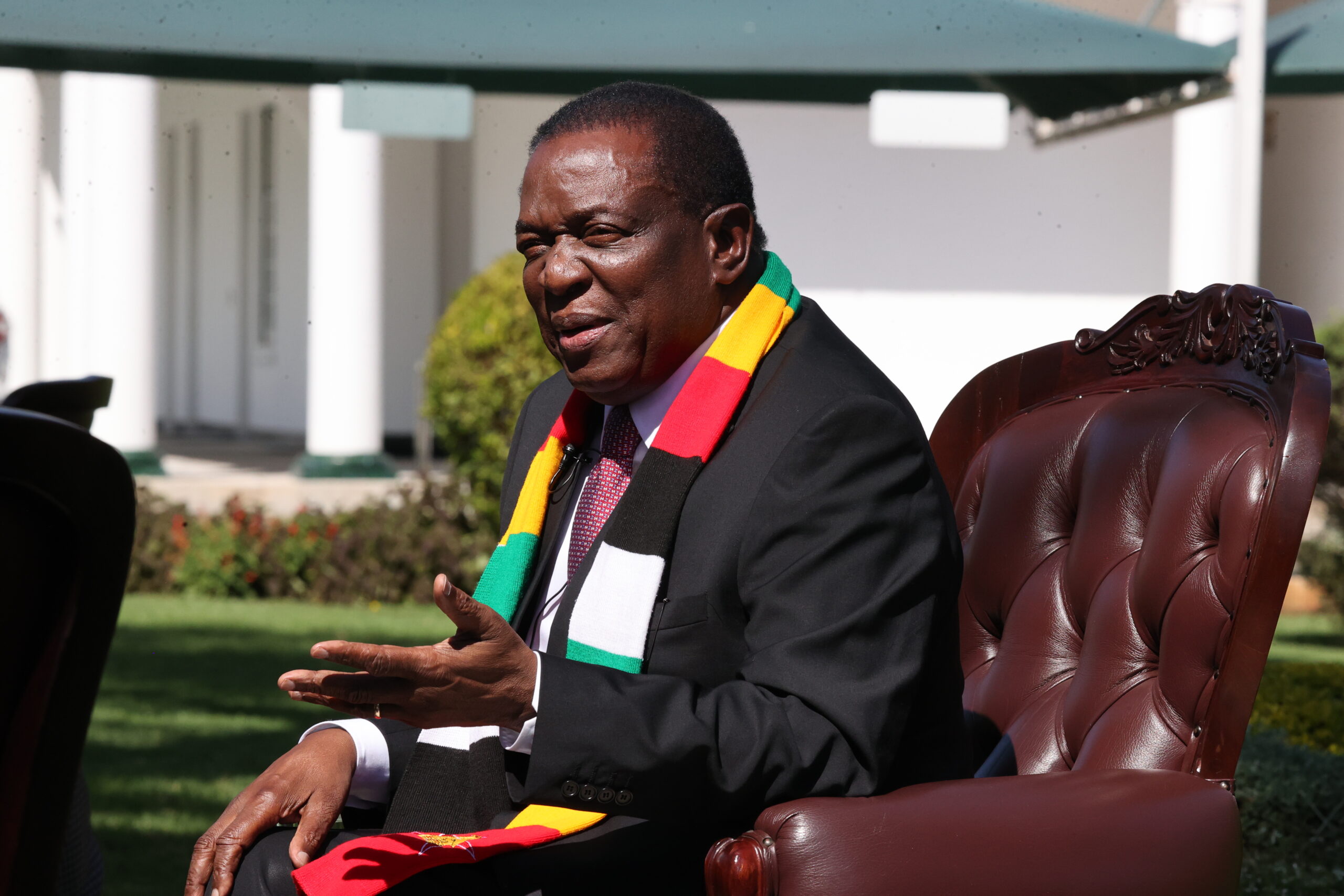
Q: Your Excellency, this is quite interesting. Some people are asking why Zimbabwe is putting so much effort towards debt resolution instead of consolidating its self-driven development which it is now famous for?
A: The debt burden becomes an issue when you want to access finance. So it is necessary to be seen to be a good debtor by addressing the debt.
Q: Still on the same issue, has Zimbabwe accepted the political conditionalities that are coming from some creditor nations considering that the debt issue is a financial issue and not a political issue?
A: What conditionalities? I am not aware?
Q: Some creditors are talking about issues such as democracy and human rights. Has Zimbabwe accepted these political conditionalities?
A: None of those countries in the West fought for our democracy. They only acknowledged it when we got it. You can’t think that we will learn democracy from the West. No, no, no. We fought for it and we shed blood for our democracy. We are qualified to teach them about democracy, not them.
Q: Let’s talk a bit about the US$3.5 billion that the government wants to pay to former white commercial farmers. Friends of Zimbabwe abroad don’t understand why this country should pay US$3.5 billion to people who took land from us and paid nothing. Why do you want to pay them?
A: Let me explain. Our own Constitution, the Constitution of this country, says we should pay for the developments on land. Not compensation for land. Our land is not for sale. That US$3.5 billion relates to developments on land which [were] brought in. When we took over the land, the developments are benefiting us. So it’s not compensation for land. No. it’s compensation for developments on the land. Make sure those who do not understand this, understand the difference.
Q: Your Excellency, under the Second Republic, the devolution agenda has gathered momentum. Is this a development strategy or a way of dealing with Matabeleland issues, especially the issue of marginalisation?
A: I am so surprised that an African can ask that question. Our own Constitution has a provision for devolution and we are implementing it. When a President is being sworn-in, he is sworn-in to defend the Constitution. I am defending it by implementing devolution.
Q: Are you happy with the progress the government has made so far to devolve?
A: Go and ask villagers how happy they are because of devolution. Now, for the first time, they access funds to deal with the immediate environmental problems they face. We used to make decisions in Harare to affect a villager in Chipinge or Plumtree, but now we put funds to the village in Beitbridge, put funds in Mt Darwin so that at village level they decide what to do. This is the concept of devolution that is in our Constitution and we are implementing it. I am happy I am obeying the Constitution.
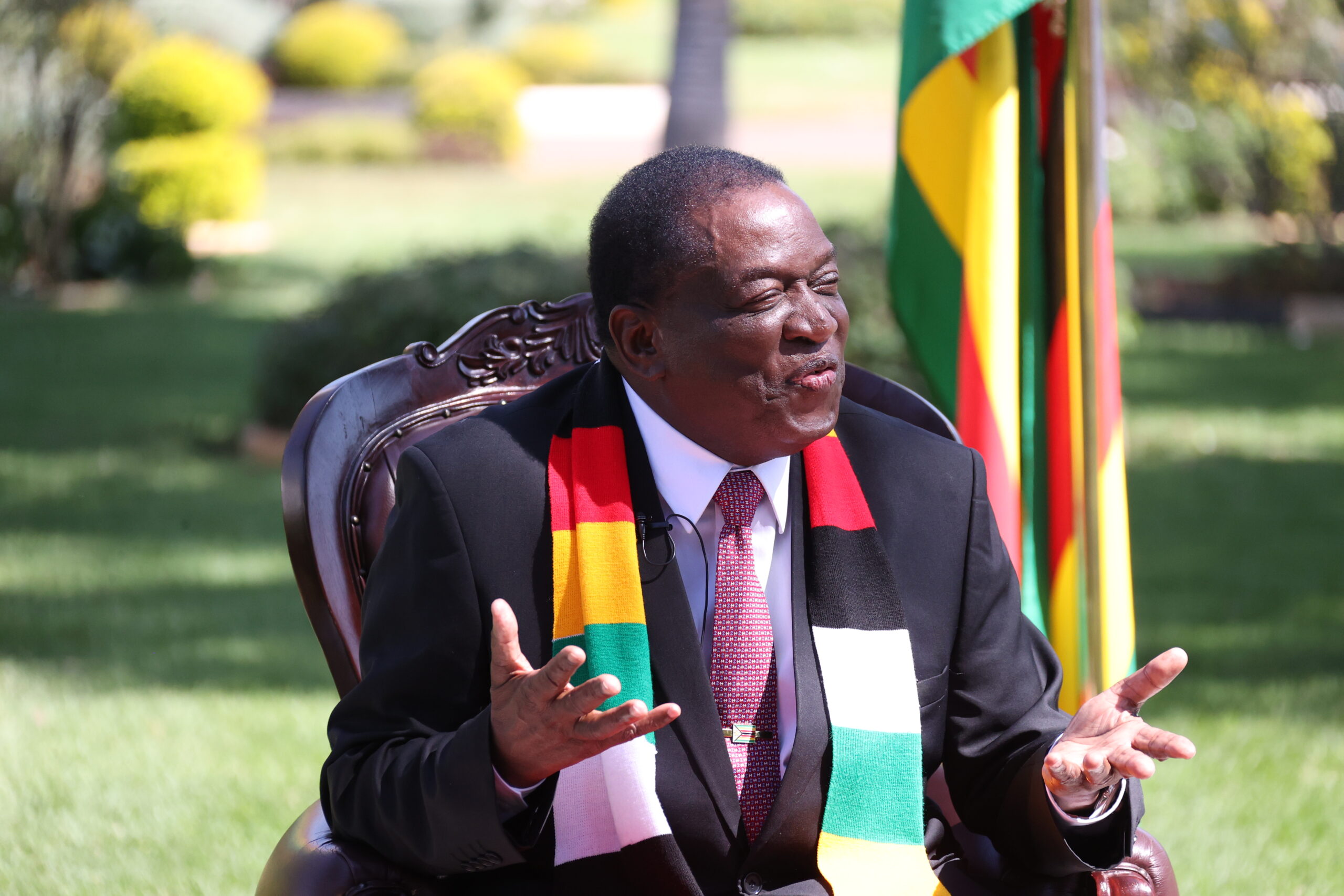
A: I don’t understand the question.
Q: We have the central government, provincial and local authorities – are systems in these three levels fully devolved?
A: According to the Constitution, 5% of the budget goes to the devolution funds, but the local authorities — whether urban or rural — have their own different allocation of funding. It’s not within the 5% of the budget. What we allocate to urban councils, rural councils, it’s different and it’s not specified. But, with regard to this particular devolution, it’s specified.
Q: Do you think the people who are supposed to champion devolution really understand the concept?
A: We have no other people, except those who are there. Whether they understand or not, we have to use them.
Q: You spoke about the attack on the Zimbabwean dollar. From your assessment, is the multi-currency system still serving this nation?
A: In 2009, I think, sanctions had succeeded to destroy our Zimbabwean currency. When you wanted bread, you had to carry two billion. That was not feasible. That is when we abandoned our currency and allowed the multiple currency system to apply — the dollar, the pound, the euro, the rand and so on. That stabilised our situation, but there is no country that can develop without its own currency.
We have reached a stage where we must have our currency, but the currency is under serious attack. However, we will never abandon it. What we might do is to legislate against foreign currency to make sure we use our own currency. Our people must know that our currency is there to stay. It must sink [in the people’s minds]. It is there to stay, but foreign currencies of other countries are not there to stay.

Q: Do you think the local currency is under attack because of the forthcoming elections?
A: Whether there are elections or no elections, they always attack our currency because they want to remain dominant in our system. That is what we want to avoid.
Q: Do you think we still need the auction regime?
A: As we go forward, we should reach a stage where we may not need it because it’s not necessary. It has been put there to deal with a particular challenge and I think that challenge is going away. We may reach a stage very soon where we may not need it.
Q: Your Excellency, in August Zimbabwe is going to hold harmonised elections. What are your chances of winning the elections?
A: Oohh, even if I was asleep and you wake me up and ask me the same question, I will answer the same way – resounding.
Q: What is giving you this confidence?
A: Because people like ZANU-PF. Wherever you go, they know about ZANU-PF, the revolutionary party that bought them independence. What else would people want?
Q: Your Excellency, still on elections, Nelson Chamisa of CCC keeps talking about talks about talks. Why are you not talking to him and will you talk to him when you win the elections?
A: He goes to the press saying he wants to talk to me. No, if you want to talk to me, you come to me, not the press. I will not reply to statements in the press. No, no, no. A solid leader knows what to do if you want to talk to your colleague. You don’t go through the press.
Q: So you are saying he has never reached out to you directly as he claims?
A: That is what he claims. You are correct in saying that is what he claims. I am not going to interrogate whether it has happened or not until it reaches me.
Q: Our last question, is about POLAD [Political Actors’ Dialogue]. What is the future for POLAD? Will there be POLAD after the forthcoming elections?
A: This POLAD was created after elections. The other elections are coming and we don’t know the results. This POLAD was a result of elections in 2018 which required POLAD. Are you saying the next ones will also require POLAD? What brings about POLAD is the results of an election. The results of elections in August are not yet out.
Q: Your Excellency, thank you so much for taking time from your hectic schedule to grant us this captivating interview. We really appreciate.
A: Thank you very much.

